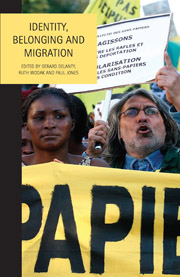Book contents
- Frontmatter
- Contents
- Acknowledgements
- List of Figures
- Notes on Contributors
- Introduction: Migration, Discrimination and Belonging in Europe
- I Theoretical Perspectives on Belonging
- II Institutional Forms of Discrimination
- III Cases of Belonging and Exclusion
- 11 Symbolic Violence
- 12 Voices of Migrants: Solidarity and Resistance
- 13 Transformations of ‘Dutchness’: From Happy Multiculturalism to the Crisis of Dutch Liberalism
- 14 Competent vs. Incompetent Students: Polarization and Social Closure in Madrid Schools
- Conclusion: Discrimination as a Modern European Legacy
- Index
13 - Transformations of ‘Dutchness’: From Happy Multiculturalism to the Crisis of Dutch Liberalism
from III - Cases of Belonging and Exclusion
- Frontmatter
- Contents
- Acknowledgements
- List of Figures
- Notes on Contributors
- Introduction: Migration, Discrimination and Belonging in Europe
- I Theoretical Perspectives on Belonging
- II Institutional Forms of Discrimination
- III Cases of Belonging and Exclusion
- 11 Symbolic Violence
- 12 Voices of Migrants: Solidarity and Resistance
- 13 Transformations of ‘Dutchness’: From Happy Multiculturalism to the Crisis of Dutch Liberalism
- 14 Competent vs. Incompetent Students: Polarization and Social Closure in Madrid Schools
- Conclusion: Discrimination as a Modern European Legacy
- Index
Summary
Just after the installation of the newly elected cabinet members in March 2007, the Netherlands witnessed the beginning of the so-called double passport debate. It followed the vote of no confidence by Geert Wilders, the leader of the right-wing Party for Freedom (PVV), with respect to two of the elected cabinet members: Ahmed Aboutaleb, the Moroccan-Dutch Assistant Secretary for Social Affairs and Employment, and Nebahat Albayrak, the Turkish-Dutch Assistant Secretary for Justice – both members of the Dutch labour party (PvdA). Wilders' vote of no confidence concerned the fact that the two members carried double passports, which he regarded as conflicting with their political loyalty to the Netherlands. Besides the legal debate on multiple nationalities, it prompted intense public discussions on loyalty, integration and Dutch citizenship.
Taking its cues from this debate, our chapter articulates two things. First, it maps out Dutch political and public transformations of the past decade with respect to cultural diversity. As we will illustrate, the Netherlands has been transformed from a multicultural welfare state in the 1990s to a country with an identity crisis whose citizens have increasingly started to support extreme right parties. We attempt to illustrate this transformation through an investigation of different, but interlocking, explanatory levels, namely, the events of two political murders and the emotive interplay of local, national and global fears of the Muslim Other. We argue that these political and public developments have engendered a national mood of ressentiment against a ‘politics from above’.
- Type
- Chapter
- Information
- Identity, Belonging and Migration , pp. 261 - 278Publisher: Liverpool University PressPrint publication year: 2011
- 1
- Cited by



